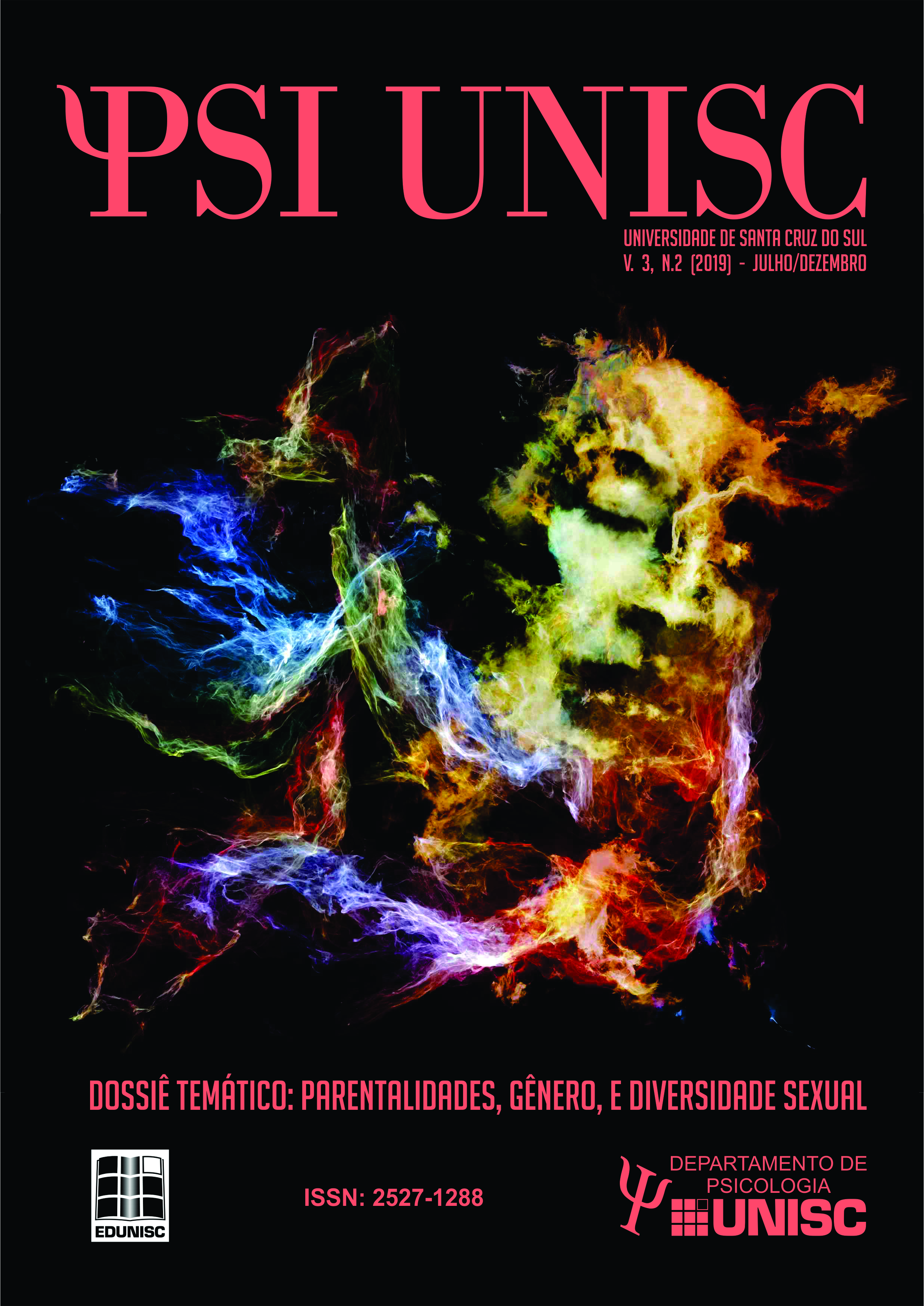The Family in the New Parenting. A Rhizomatic Thinking
DOI:
https://doi.org/10.17058/psiunisc.v3i2.13385Keywords:
Families, Parenting, Rizoma.Abstract
In this paper we perform some points about the implications of working and researching with families and parenting in the current geopolitical scene. They are reflections from the university teaching of a Social Psychology in Uruguay. We try to problematize what is meant by family and to that end we take some lines of meaning of the word to focus the analysis. One of them is to think of it as an institution in its game of conservation and change, based on socio-historical contexts. Another approach to analysis is the articulation that occurs in the contemporaneity between family and new parenting, understanding the concept of parenthood as an analyzer of time. Next, we refer to the place that the family acquires in the speeches of the anti-gender movements, which attack the rights conquered and proclaim the return to the traditional family. In that sense we ask ourselves about the threats that arise in the new family compositions and the production of alternative subjectivity to the capitalist logic. As a closure, a rhizomatic thinking is proposed that takes into account the connection between family and politics as well as an intersectional analysis of the inequalities present in families. The intention is to deepen the connections between the construction of the collective and the common in the new parenting. As well as the ethical-political challenge for Latin American public universities, so that they are spaces of free thought production and situated in current debates.
Downloads
References
Correa, S. (2018). Ideología de Género: rastreando sus orígenes y significados en la política de género actual. [SPW, fórum global]. Recuperado de: https://sxpolitics.org/es/ideologia-de-genero-rastreando-sus-origenes-y-significados-en-la-politica-de-genero-actual/3858
Santos, N., Di Fabio, C., Marotta, A. C., Pierri, L. (2018). Parentalidades en acción. ¿Familias en cuestión? Una aproximación a las encrucijadas de la intervención. Revista Fronteras, 11, 77-87. Recuperado de https://www.colibri.udelar.edu.uy/jspui/handle/20.500.12008/19999
Deleuze, G. (2018). La Subjetivación: Curso sobre Foucault, tomo III. Buenos Aires, Argentina: Cactus
Deleuze, G., & Guattari, F. (2004). Introducción. In G. Deleuze, & F. Guattari, Mil Mesetas: Capitalismo y esquizofrenia (pp. 9-21). Valencia, España: Pre-textos.
Duschatzky, S. & Corea, C. (2006). Chicos en band: Los caminos de la subjetividad en el declive de las instituciones. Buenos Aires, Argentina: Paidós
Eira, G. (2002). Familia y grupo familiar. In J. Fernández, & A. Protesoni (Comp.), Psicología Social: Subjetividad y Procesos Sociales (pp.71-80). Montevideo, Uruguay: Ediciones Trapiche
Federici, S. (2018). El patriarcado del salario: Críticas feministas al marxismo. Buenos Aires, Argentina: Tinta y limón
Fernández, A. M. (1992). El campo grupal. Buenos Aires, Argentina: Nueva Visión
Fernández Christlieb, Pablo (2019). Todos los psicólogos sociales: recapitulación de cuatro o cinco décadas. Athenea Digital, 19(1), e2444. doi: 10.5565/rev/athenea.2444
Fernández Christlieb, P. (2003). Political psychology as social aesthetics. Revista Interamericana de Psicologia/Interamerican Journal of Psychology, 37(2), 253-266. doi: 10.30849/rip/ijp.v37i2.824
Guattari, F. (1998). I. Conferencias: La producción de subjetividad del capitalismo mundial integrado. In F. Guattari, In El Devenir de la Subietividad: Conferencias, Entrevistas, Dialogos (Chile, 1991) (pp. 25-40). Santiago de Chile, Chile: Dolmen Ediciones
Guattari, F., & Rolnik, S. (2006). Micropolítica: Cartografias do desejo. Petrópolis, Brasil: Vozes.
Gutierrez, R. (2015). Desandar el labirinto: Introspección en la feminidad contemporánea. Buenos Aires, Argentina: Tinta y limón.
La Barbera, M. C. (2016). Interseccionalidad, un “concepto viajero”: orígenes, desarrollo e implementación en la Unión Europea. Interdisciplina, 4(8), 105-122. doi: 10.22201/ceiich.24485705e.2016.8.54971
Martin, C. (2003). La parentalite en question: Perspectives sociologiques. Rapport au Haut conseil de la population et de la famille. Recuperado de: http://www.ladocumentationfrancaise.fr/rapports-publics/034000552/index.shtml
Scott, J. (1996). El género, una categoría útil para el análisis histórico. In M. Lamas (comp.), El género: la construcción cultural de la diferencia sexual (pp. 265-302). México: UNAM.
Roudinesco, E. (2003). La familia en desorden. Argentina: Fondo de Cultura Económica.
Roussillon, R. (2002). Espacios y prácticas institucionales: La liberación y el intersticio. In R. Kaes, J. Bleger, E. Enriquez, F. Fornari, F. Fustier, R. Rousillon, J. P. Vidal, La institución y las instituciones: Estudios psicoanalíticos (pp. 188-212). Argentina: Paidós.
Uruguay. (2007). Ley nº 18.246, Union Concubinaria. Recuperado de https://legislativo.parlamento.gub.uy/temporales/leytemp5391125.htm
Uruguay. (2012). Ley nº 18987, Interrupción voluntaria del embarazo. Recuperado de https://www.impo.com.uy/bases/leyes/18987-2012/3
Uruguay. (2013). Ley nº 19.075, Matrimonio Igualitario. Recuperado de https://legislativo.parlamento.gub.uy/temporales/leytemp3233547.htm
Uruguay. (2018). Ley nº 19684, Ley integral para personas trans. Recuperado de http://www.impo.com.uy/bases/leyes/19684-2018
Vega, C., Martinez, R., & Paredes, M. (2018). Experiencias y vínculos cooperativos en el sostenimiento de la vida en América Latina y el sur de Europa. Madrid, España: Traficantes de sueños
Downloads
Published
How to Cite
Issue
Section
License
The submission of originals to this journal implies the transfer, by the authors, of the printed and digital publication rights. The copyrights for the published articles are those of the author, with periodical rights on the first publication. Authors may only use the same results in other publications clearly indicating this journal as the medium of the original publication. Because we are an open access journal, we allow free use of articles in educational and scientific applications provided the source is cited under the Creative Commons CC-BY license.




